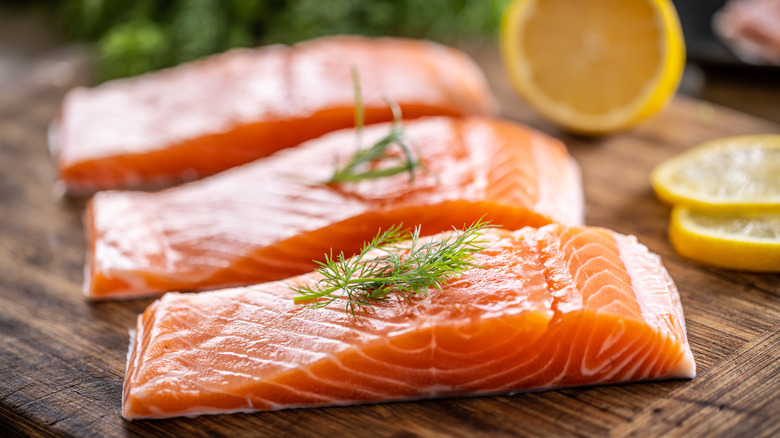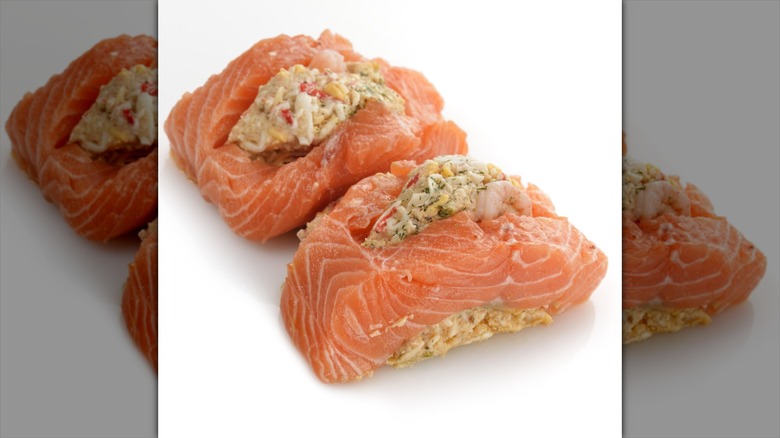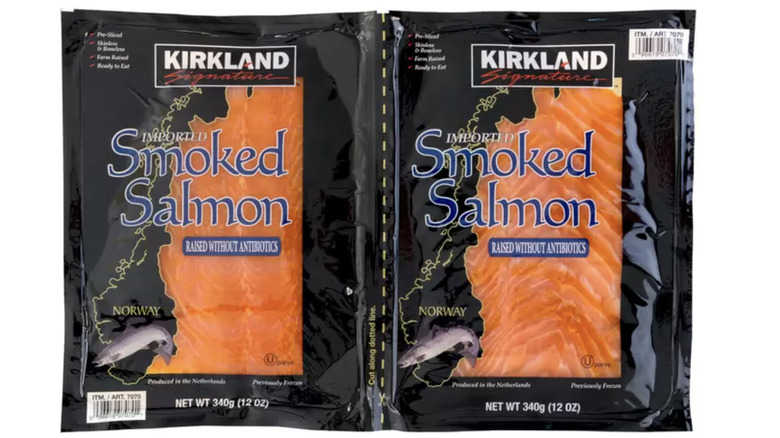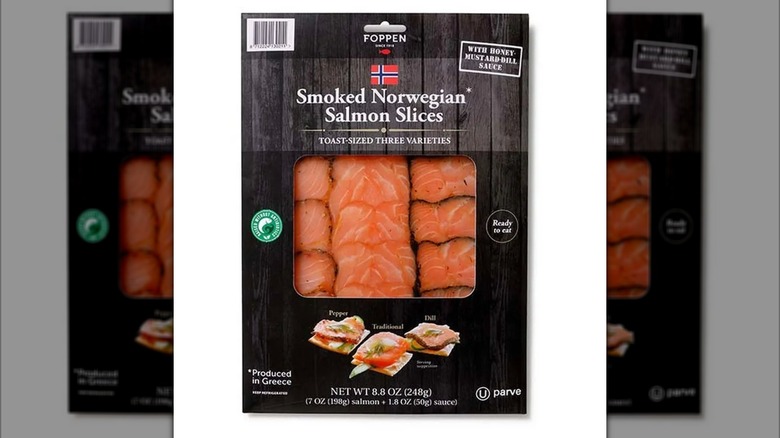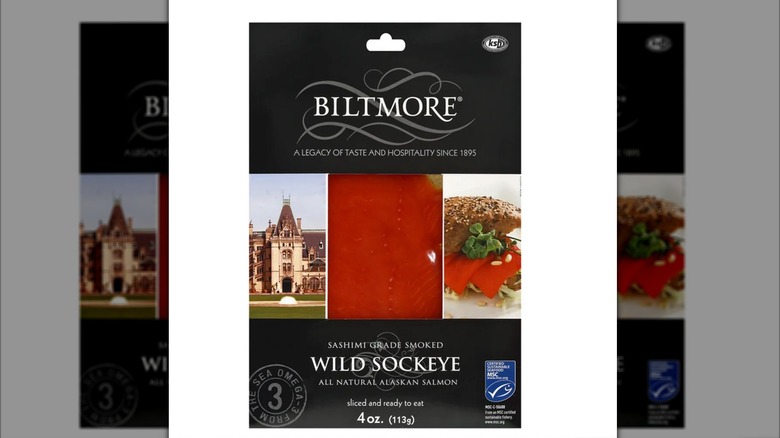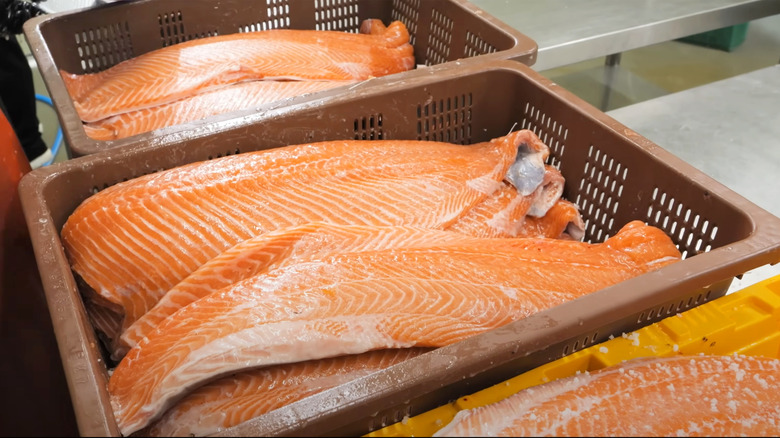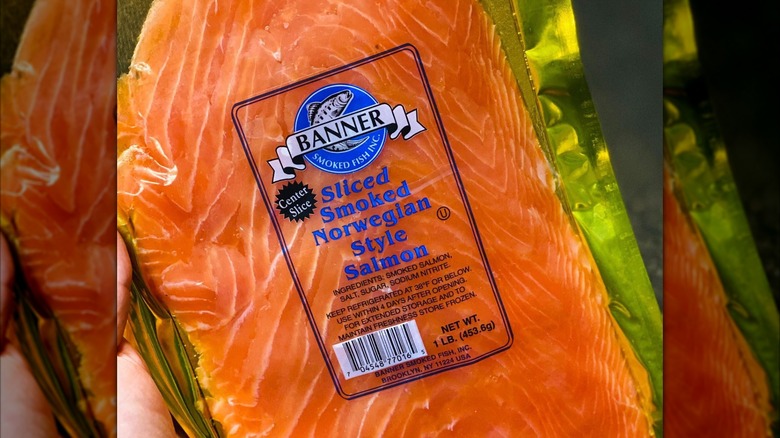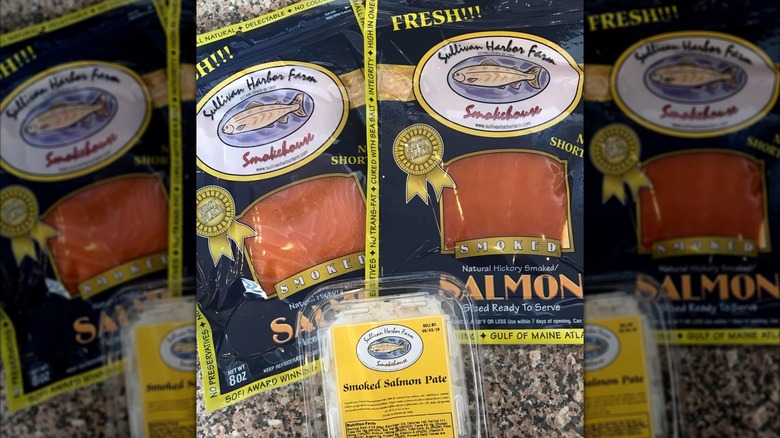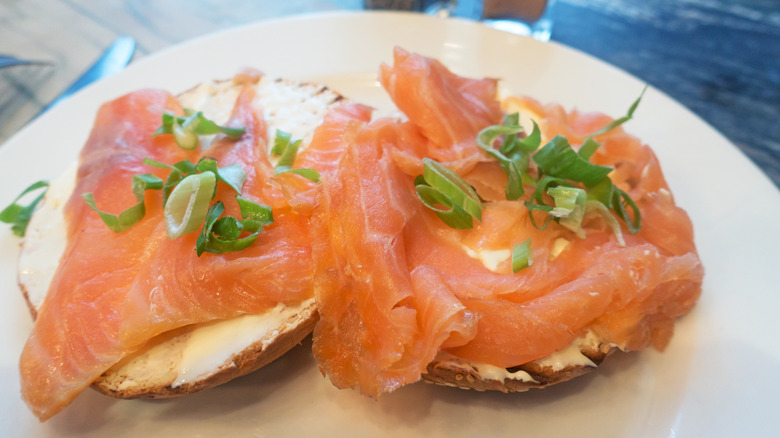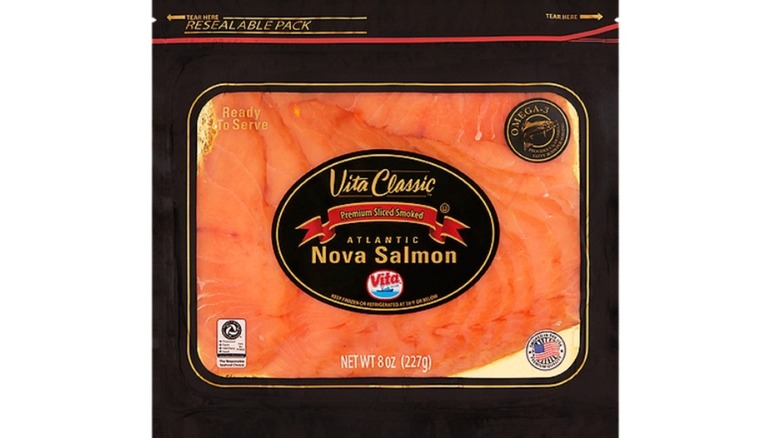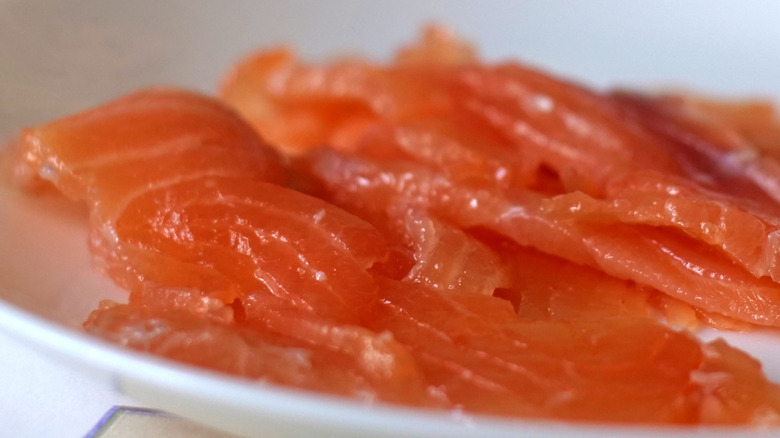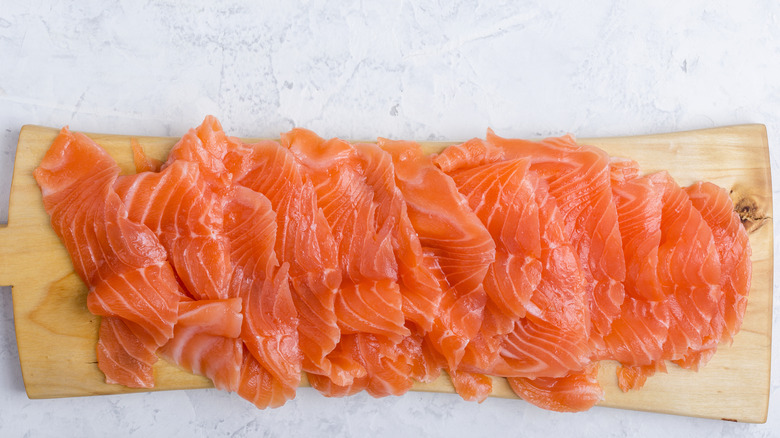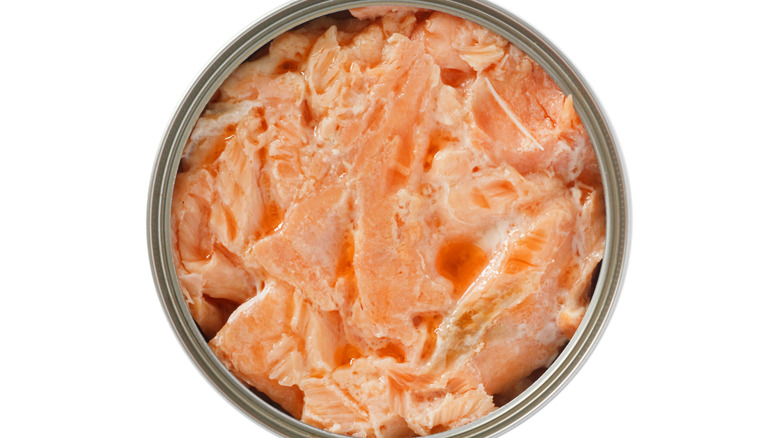12 Salmon Recalls That Affected Millions
In 2024, North America accounted for over 40% of the global salmon market (via Cognitive Market Research). That's a sizable percentage, and there are a few good reasons for this impressive consumer demand. Not only is salmon loaded with omega-3 fatty acids, vitamin B12, and selenium, it's also delicious and very versatile. Whether baked in a creamy sauce, savored with eggs, or turned into a smoked salmon dip, salmon is one of those ingredients that can be easily incorporated into a huge range of dishes.
Despite its reputation as a healthy and versatile protein, salmon has experienced its share of controversy. In fact, salmon has been at the center of some of America's biggest food recalls, sparking concerns among consumers. From can defects and mislabeling to fears over contamination with listeria and salmonella, the flaky fish has repeatedly made headlines, highlighting the importance of strict food safety standards. Let's dive deep into some of the biggest salmon recalls in U.S. history.
Santa Monica Seafood recalls stuffed salmon due to an undeclared ingredient (2025)
Undeclared ingredients are one of the main causes of food recalls. After all, it's crucial that consumers who are allergic to a certain product are able to ensure that what they are eating won't trigger a dangerous reaction. This risk became a reality in May 2025 when Santa Monica Seafood recalled 16-ounce packages of fresh Atlantic salmon portions with seafood stuffing due to a labeling oversight. More specifically, the product could have contained soy, which is one of the nine major allergens listed by the FDA, alongside eggs, milk, fish, shellfish, tree nuts, wheat, peanuts, and sesame.
The labeling problem was identified by a supplier while carrying out a standard quality check on a completed production run. Unfortunately, the batches of the product had already been shipped to Aldi stores in California, Nevada, and Arizona. Underscoring the potentially devastating consequences of the labeling error, the FDA gave the recall a Class I grade, which applies to "a situation in which there is a reasonable probability that the use of, or exposure to, a violative product will cause serious adverse health consequences or death."
Acme Smoked Fish Corporation recalls Kirkland Signature Smoked Salmon due to potential contamination with Listeria monocytogenes (2024 and 2025)
The Acme Smoked Fish Corporation first raised the alarm that Costco's Kirkland Signature Smoked Salmon might be contaminated with Listeria monocytogenes in October 2024. The fish had been vacuum-sealed in twin 12-ounce plastic packages, which were shipped to the Southeast Costco Distribution Center in West Palm Beach, Florida, plus Costco Warehouse stores in Florida.
The recall was announced after the dangerous pathogen was found in some of the products. In January 2025, the FDA upgraded the recall to Class I, reserved for situations where the product can cause serious illness or death.
While no reports linked Kirkland Signature Smoked Salmon to consumer illnesses at the time, Listeria monocytogenes can be extremely dangerous. In healthy adults, the bacteria can lead to listeriosis, causing symptoms such as diarrhea, nausea, fever, and headaches. In addition, it can be especially hazardous for young children, the elderly, and individuals with compromised immune systems, even resulting in death.
Foppen Seafood recalls Smoked Norwegian Salmon Slices due to possible listeria contamination (2024)
The delicate melt-in-the-mouth texture of smoked salmon can add a gourmet touch to everyday meals. Velvety smoked salmon pairs beautifully with bagels, eggs, salads, and sandwiches, and shines on charcuterie boards. Unfortunately, in 2024, Foppen Seafood found itself in the spotlight when the company recalled its smoked salmon due to possible contamination with Listeria monocytogenes.
Foppen Seafood is a Netherlands-based company that specializes in the production of cold-smoked and hot-smoked salmon, distributing them worldwide. The recall involved toast-sized Foppen Smoked Norwegian Salmon Slices with honey mustard dill sauce. The presence of bacteria was discovered during routine product testing, triggering the withdrawal of the tainted product from the stores. The 8.1-ounce packages of the smoked salmon slices were sold in Kroger and Pay Less Supermarkets across 15 states, making this recall relatively widespread.
Seven Seas International USA recalls Biltmore Smoked Sockeye Salmon over fears of contamination (2023)
Also called red or blueback salmon, sockeye salmon is known for its firm, red flesh and rich salmon flavor. Native to the Pacific Ocean, sockeye salmon is often dry‑cured and cold‑smoked. In 2023, the fish made headlines in the worst possible way when Seven Seas International USA recalled 295 cases of Biltmore Smoked Sockeye Salmon due to possible contamination with Listeria monocytogenes, a pathogen that can cause severe illness in healthy adults and pose an even higher risk to those with weak immune systems.
The 4-ounce packages of Biltmore Smoked Sockeye Salmon had been shipped to Publix stores. The fish was sold in clear, vacuum-sealed bags packaged in black carton sleeves. The safety alert was triggered after the Florida Department of Agriculture found the pathogen in some of the products during routine testing. While no illnesses were linked to the smoked fish at the time, Seven Seas International USA recalled the product as a precautionary move.
Mariscos Bahia recalls fresh salmon following salmonella outbreak (2022)
In 2022, Mariscos Bahia recalled fresh salmon and other fish types after 39 people contracted salmonella infections from eating the product, 15 of whom had to be hospitalized. The illnesses spanned four states: California, Arizona, Illinois, and Texas. The raw fish included fresh salmon fillets, fresh deep skin salmon fillets, and fresh salmon portions. Other fish — such as Chilean sea bass, halibut, tuna, and swordfish — were also impacted.
The California Department of Public Health discovered contamination after taking environmental samples at the Mariscos Bahia facility in Pico Rivera, California, thus linking the fish to the outbreak. In total, the company recalled around 150 tons of raw fish, which had been supplied to restaurants in California and Arizona.
Salmonella is one of the most common causes of foodborne illness around the world. Most people who come into contact with the bacteria experience symptoms such as diarrhea, stomach cramps, and fever. These typically start within 8 to 72 hours of exposure. While most people recover, severe cases can become life-threatening, particularly in young children, older adults, and those with weakened immune systems.
Banner Smoked Fish recalls smoked salmon because of possible contamination with listeria monocytogenes (2021)
Founded in 1988 in Brooklyn, New York, as a family-run operation, Banner Smoked Fish was acquired by Acme Smoked Fish Corporation in 2024. The company hasn't changed its core focus, producing smoked and cured fish such as salmon, tuna, whitefish, sable, trout, herring, and whiting.
Three years before the acquisition, in 2021, Banner Smoked Fish faced a food safety crisis after the FDA discovered that the company's smoked fish products — including salmon — were not processed in sanitary conditions. The discovery raised serious concerns about potential Listeria monocytogenes contamination and triggered a recall.
The recall involved over 40 different fish products, including salmon offerings such as Norwegian Style Smoked Salmon, Naturally Smoked Nova Salmon, and Presliced Scotch Style Smoked Salmon. Packaged in either air-pack or vacuum-sealed form, the products came in a range of sizes and weights. The affected fish had been shipped to retailers in 17 states and was also sold online.
Sullivan Harbor Farm Smokehouse recalls cold-smoked salmon amid botulism fears (2019)
Smoked salmon enthusiasts got unsettling news in 2019 when Sullivan Harbor Farm Smokehouse issued a recall of its cold-smoked salmon due to potential contamination with Clostridium botulinum. The recall was initiated after it was discovered that the fish didn't contain enough salt to prevent the growth of the dangerous pathogen. More specifically, the salmon's water phase salt content was lower than 3.5%, which means that it should have been eaten immediately after defrosting. This wasn't in line with the product's label, which stated that it could be refrigerated — a storage method that would have left it susceptible to contamination.
The affected smoked salmon was sold in vacuum-sealed packaging in a range of sizes, including whole salmon sides, 1 pound, 2 pounds, 4 ounces, and 8 ounces. The salmon was sold in 23 states and online, making the recall particularly tricky. While the fish was sold frozen, the concern was that consumers could have already thawed it and stored it in the refrigerator rather than the freezer.
Clostridium botulinum is a dangerous bacterium that can cause symptoms such as dizziness, weakness, double vision, and difficulty breathing and swallowing. In the worst-case scenario, botulism can even be fatal. Luckily, no infections were linked to the smoked salmon at the time of the recall.
Springfield Smoked Fish recalls smoked salmon and other products due to listeria monocytogenes contamination (2017)
Established in 1934 in Springfield, Massachusetts, the Springfield Smoked Fish Company produced a long list of fish products, smoking many in traditional, antique block ovens over wood fire. In 2017, the company faced a significant challenge when its products tested positive for Listeria monocytogenes.
On December 13, 2017, Springfield Smoked Fish recalled its 1-pound, clear plastic packages of pre-sliced Nova salmon after the FDA found that some of the products were potentially contaminated with Listeria monocytogenes. Just six days later, the company expanded the recall to other Springfield Smoked Fish and Rachael's Springfield Smoked Fish products. This included hot smoked salmon steaks, smoked whole whitefish, and smoked trout. Non-fish products impacted by the recall included a variety of cream cheese spreads. The products were shipped to Massachusetts, Connecticut, New York, Rhode Island, Colorado, Ohio, and Pennsylvania, and were also available online.
Vita Food Products recalls sliced smoked Atlantic salmon due to possible contamination with Listeria monocytogenes (2014)
Smoked salmon is especially prone to contamination. The fish is typically cold-smoked, which means that it's cured at low temperatures rather than cooked. Cold-smoking doesn't kill Listeria monocytogenes, which is a problem if the facility where the fish is cured is contaminated with the pathogen. In 2014, Vita Food Products found itself in precisely this predicament when it recalled 1,878 pounds of Vita Classic Premium Sliced Smoked Atlantic Salmon. The safety alert was announced after the Florida Department of Agriculture and Consumer Services detected traces of Listeria monocytogenes during random testing of the product.
The 4-ounce packages of Vita Classic Premium Sliced Smoked Atlantic Salmon were sold at three grocery store chains. These included Hannaford stores in New York, Massachusetts, Vermont, and New Hampshire, H-E-B stores in Texas, and Publix stores in Alabama, Florida, Georgia, and South Carolina. It's unclear how the bacteria ended up in the product. Interestingly, a very similar recall took place in 2011 that saw the company also pull Vita Classic Premium Sliced Smoked Atlantic Salmon from supermarket shelves due to contamination.
Salmolux recalls smoked salmon due to possible contamination (2013)
Founded in 1988 and acquired by the Pacific Seafood Group in 2009, Salmolux specializes in the manufacture of hot- and cold-smoked seafood using traditional European smoking techniques. The company sources most of its seafood from the Pacific Northwest. Just four years after the acquisition, Salmolux suffered a setback after its smoked salmon products were found to be contaminated with Listeria monocytogenes. Highlighting the severity of the issue, the FDA classified it as a Class I recall, indicating that consuming the salmon could lead to serious illness and even be fatal.
In 2013, Salmolux announced that it was recalling nearly 5,000 pounds of cold-smoked salmon produced at its Washington facility. The fish was sold under three different brands, including Sea Passion, Jensen's Old Fashion Smokehouse, and Raley's. The smoked salmon was sold in a range of package sizes in either fresh or frozen form. The products had been shipped to retailers across 10 states. Fortunately, no adverse health effects were linked to the salmon when the recall was announced.
Vita Food Products recalls smoked salmon over contamination fears (2011)
Vita Food Products has been around for quite some time. Founded in 1898, the seafood processing plant is still recognized for its premium smoked salmon and pickled herring varieties over a century later. Today, these are sold under the Vita, ELF, and Grand Isle brands.
Years before its 2014 recall, Vita Food Products found itself under the microscope after its Vita Classic Premium Sliced Smoked Atlantic Nova Salmon tested positive for Listeria monocytogenes. Graded as a Class I voluntary recall by the FDA, Vita Food Products' 2011 recall involved over 8,000 4-ounce packages of smoked salmon.
The affected retailers included Publix, Meijer, Vons, Genuardi's, and Winn-Dixie stores in multiple states, plus the Edgewater Produce store in Chicago. No confirmed illnesses were reported after consumption of the product at the time it was pulled off the shelves.
Alaskan canneries recall canned salmon due to concerns over fatal case of botulism (1982)
The 1982 Alaskan canneries recall was triggered after a man in Belgium died of botulism after eating contaminated canned salmon produced in a U.S. facility. An FDA investigation of a plant in Alaska revealed that the equipment at the facility was to blame for damaging the cans and creating the conditions for the growth of the botulinum toxin. More specifically, it was determined that the defective machinery that shaped the cans punctured the metal.
The incident triggered one of the largest food recalls in FDA history, with nine canneries in Alaska removing close to 23 million cans of salmon from supermarket shelves. This made up a large share of the 1980 and 1981 production, which amounted to 60 million cans. The recalled cans were sold under a range of brand names. All in all, the FDA ended up inspecting around 300,000 7¾-ounce cans that had been formed using the questionable equipment as part of its investigation, with 22 of the tins proving defective.
